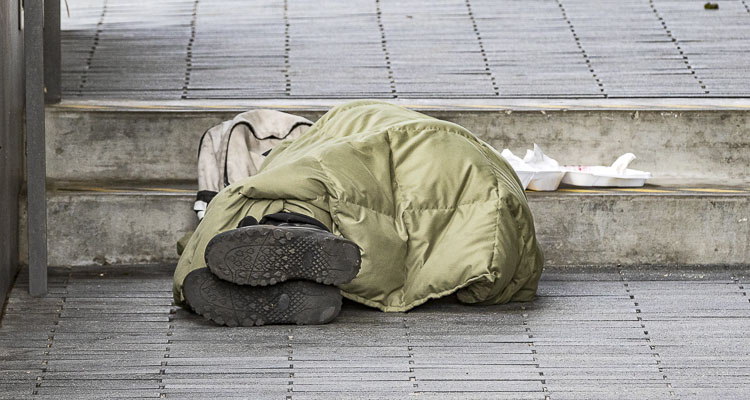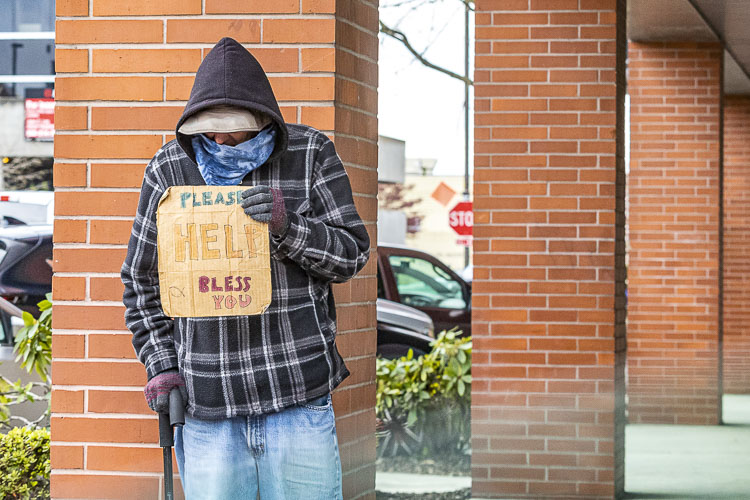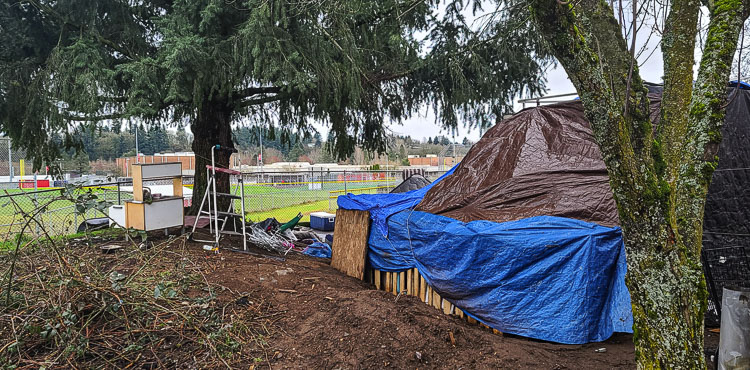
Council for the Homeless to hold webinar next week to discuss findings of its annual report
It takes weeks of planning, even months, to capture the one day report on the state of homelessness in Clark County.
There is a day, every year, when communities across the nation attempt to take a snapshot of the population of those experiencing homelessness.
There is also an annual report.
In Clark County, it is the Council for the Homeless that compiles the information, provides those reports to partners and government agencies, and makes recommendations based on those numbers.
“Housing is a human need, and everyone needs a home,” said Charlene Welch, development and communications director of the Council for the Homeless.
There are more than 30 partners in the region that input their data into the Homeless Management Information System. Shelters. Churches. Veterans groups. And more. The Council is the hub of data collecting, taking the numbers and giving everyone in the battle a glimpse at the issues.
“We are stronger when we coordinate and we don’t duplicate resources,” Welch said. “We might have disagreements about how to allocate funding or this approach versus that approach, but if we can keep the conversations going … The heart of the community is really there.”

Sunny Wonder, the department’s deputy director, echoed those thoughts.
“We have so many people who care so deeply about this,” she said. “We have so many people who are willing to engage with these numbers and willing to engage with creative thinking.”
This year’s Point in Time count was conducted in February. (Usually, the one-day count is held in January. It was pushed back a month in the pandemic.)
On Feb. 24, 2022, there were close to 1,200 people in Clark County experiencing homelessness. There were 625 unsheltered, 389 in emergency shelters, and 183 in transitional shelters
“The Point in Time count is our best effort to try to count everybody in one day,” said HMIS administrator Dale Whitley. “PIT count is always a best effort. No PIT count coordinator can say they counted every single person. I like to define it as we know there were at least this many people on that day that we were able to count.”
The shelters throughout the county give their reports, plus there are street count teams that are sent out across the county to known places where people are living outside.
As far as the annual report, the 2021 numbers are in, as well. In all, 6,285 people from 4,036 households in Clark County experienced homelessness at any point during 2021. Of those, 61 percent described themselves as newly homeless, 40 percent identify as Black, Indigenous, or People of Color, and 27 percent are children under the age of 18.
The numbers help authorities ask more questions.
“Who makes up the homeless population?” Welch asked. “It’s seniors. Families. Adults with no kids. Teenagers who are on their own without an adult. Where can we put the resources? How do we advocate for more resources? Part of what the data helps us do is identify where the gaps are in the system.”

Just a couple years ago, there were six outreach workers in the community. The numbers demanded more help was needed. Today, there are 30.
“Obviously homelessness is very visible in our community right now,” Welch said. “One of the things we are focused on as a community is what we call coordinated outreach. That is where we have specially trained staff … who are consistently going out into those encampments and building trusting relationships with the people who live there.”
It takes time, but eventually, the goal is to bring those people into the system in hopes of escaping homelessness.
“One thing about homelessness is the solutions are not one-size-fits-all,” Welch said. “Some might need just a little bit of help. Some people are going to need help for the rest of their lives. The homeless system and all the partners that make it up are plugged in at every different stage along that continuum of need with different programs and with different resources.”
Included in the partnership are city and county leaders. The Council for the Homeless has representation on ECHO — Ending Community Homelessness Organization — which includes leaders from the county, as well as the cities of Vancouver, Camas, Battle Ground, La Center, Ridgefield, and Washougal.
“We serve as bringing the data, sharing with them what is happening in their communities, what programs are being effective, which practices are being effective around the country,” Welch said. “We’re bringing recommendations for them to consider.”
The Council for the Homeless is holding a webinar at 5:30 p.m. on July 12 to share results of the 2021 annual report. The link to the webinar is:
https://us06web.zoom.us/webinar/register/WN_mGNbcN55QxGyRNPRBMM-zA
It is the sharing of data that helps find more solutions to a very complex issue. And there is a goal in mind.
“We firmly believe that our community needs to have housing that is available and affordable to people of all income levels, and right now we do not,” Welch said.
“When people have a home in the community, we all win.”
Notes:
The 2021 report on homelessness can be found here: https://www.councilforthehomeless.org/annual-system-data-2021/
The Point in Time count for Feb. 24, 2022 can be found here: https://www.councilforthehomeless.org/point-in-time-count/
Also read:
- Letter: ‘We’re going to give them some money and a plane ticket, and then we’re going to work with them’Camas resident Anna Miller supports a new structured self-deportation policy, calling it a balanced approach to immigration and economic needs.
- Pro-Palestinian protesters occupy UW building, 30 arrestedAbout 30 protesters were arrested at the University of Washington after occupying a building and demanding the school cut ties with Boeing.
- Sen. Braun praises UW officials for response to Monday protests, calls for prosecutionsSen. John Braun praised UW officials for their firm response to violent protests tied to the university’s relationship with Boeing.
- Largest parade in Southwest Washington bands together for a better tomorrowThe 59th annual Parade of Bands in Hazel Dell will feature 24 high school bands and more than 120 entries on May 17.
- Don’t leave tax dollars on the table; learn about county’s tax exemption program at May 16 event in WashougalClark County tax exemption specialists will assist seniors and people with disabilities during a May 16 event in Washougal.
- Trades Tuesday is here, hoping to become a trend in area schoolsA new campaign is launching in area schools to inspire students to consider careers in the trades.
- Opinion: What the 2025 legislature tells us about why Washington’s government keeps failingTodd Myers of the Washington Policy Center argues that Washington’s government fails because it resists humility, experimentation, and accountability in its policymaking.












“If you build it, they will come”
The more services and “compassion” that are provided, the more homeless there will be. You cannot provide enough material goods and compassion to rid yourself of homelessness.
It quickly becomes a choice of: “Am I better off working and struggling every day to pay my bills, or just being homeless and getting free food and free housing and free stuff.”
Homelessness should never be the better choice. Homelessness should never be a viable choice. Making it the better, workable, viable choice (by providing ever-increasing goods and services) is simply enabling homelessness.
We all know the root of, what, 95% of homelessness… that being drugs and mental illness. Many (most?) community residents are simply afraid to admit that the “cure” is likely an unobtainable dream. Residents want to think (hope?) the homeless are the suddenly-laid-off single mother with two smart, adorable children who just need some temporary housing and some job-placement assistance to make life all better again. Such a scenario represents such a miniscule % of the homeless that it’s likely difficult to even determine.
BTW…. what’s the return-on-investment for Vancouver’s two “tiny cubicle camps” for which us taxpayers are paying? Sure, the former squalid camps were cleaned up and relocated, but couldn’t that have been done with far less money than the current setup in which some 3rd-party organization is being well paid to run the camp?
The more services and “compassion” that are provided, the more homeless there will be.
Wow it’s like we’re in the early 80s again and Reagan is telling us about how anyone that gets food stamps or Section 8 housing is secretly a “welfare queen” that lives better than all the hard-working white, middle class voters. It wasn’t true when Reagan said it and it isn’t true now. Free stuff leads to negative outcomes? If that’s the case, let’s apply it to more than homelessness.
1) No tax exempt status for churches. If you give people free stuff they won’t work and I want these churches working hard to save our souls.
2) No free meals for school children. If we give them free meals it will “indoctrinate” them into not working and just living off the government as adults.
3) No Medicare or Medicaid. Old people and the disabled need to pull themselves up by their bootstraps and stop choosing to be old and/or disabled (you know, like all the homeless people that choose to be homeless). From what I hear around CCT healthcare isn’t a right anyway so this should be an easy sell. Providing healthcare to the supposedly elderly or disabled will simply incentivize people to not plan for their retirement.
4) No Social Security. See #4.
It should be obvious that I write this sarcastically, but then again it should be obvious that no one thinks to themselves “Well, I COULD go get a job and a place to live, but being homeless is just so cushy and comfortable I’ll do that instead.”
I honestly don’t know the solution, but I’ll end with a comment that will get me some delightful dislikes. Improving the homeless situation by providing less support and services makes as much sense as improving the gun violence situation by making sure more people have more guns (with less background checks, of course). Which is to say it makes no sense at all.